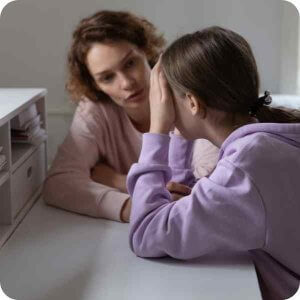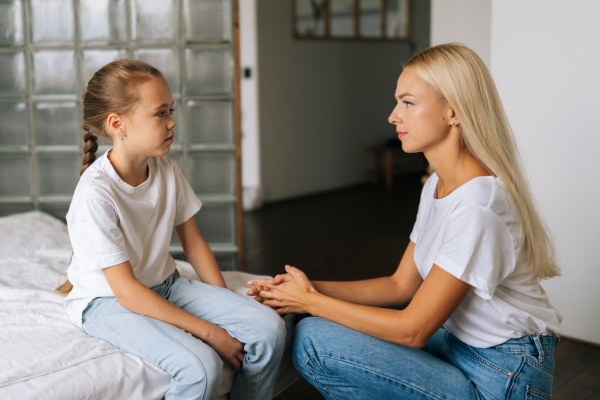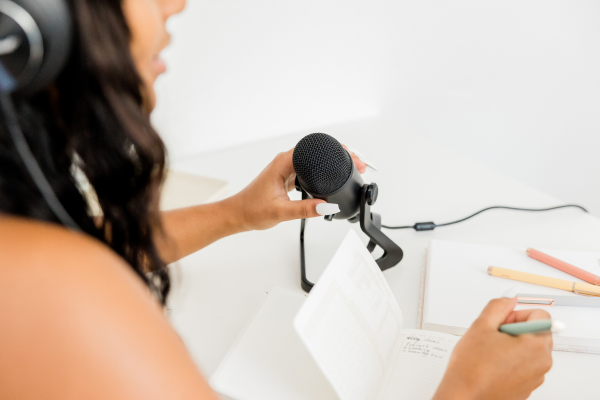 From a global pandemic to Russia and Ukraine, these past few years can fill the chunkiest of history books. We’re witnessing history in the making, and with us, our kids. Regardless of how careful we are when talking about what is happening around us, kids can sense when something is not right. As parents, we’re worried about what to share and how much, in a way that is not detrimental to our children.
From a global pandemic to Russia and Ukraine, these past few years can fill the chunkiest of history books. We’re witnessing history in the making, and with us, our kids. Regardless of how careful we are when talking about what is happening around us, kids can sense when something is not right. As parents, we’re worried about what to share and how much, in a way that is not detrimental to our children.
To support you as you navigate (yet another) world event as a parent, we’ve enlisted the help of MyMama’s expert psychotherapist Xanthe’ Schembri. In this interview, Xanthe’ explains why and how we should talk to children about what’s happening, how we can help them come to terms with the world around them, and signs to look out for that indicate a child may not be coping well with distressing events.
For personal support throughout your parenting journey, check out Xanthe’s services offered through MyMama!
Discussions & Conversations
1. Should we talk to children about distressing world events?
We would rather prefer to talk to children about fantasies, dreams and fun stuff, yet bad things happen – so do distressing world events. We have lived through a pandemic and now through Ukraine – Russia tension. We have absolutely no control over these circumstances, but instead we can look at such situations as an opportunity to strengthen relationships during difficult times and build children’s resilience whilst at it. Ultimately, this is the world they have to live in.

The best way to protect our children is to shape the lessons gained during this difficult time; both for parents and children alike. So, my answer is definitely a yes! Children look up to their parents and expect them to help them make sense of the world around them and how to deal with difficult information or to learn to cope with new challenging experiences. Parents become unintentionally protective over their children and would want to shield them off any danger, tragedies, or any other negativity which can infilter their innocent lives. However, children are still able to pick up cues of what’s happening. They can also feel the tension of what’s going on around them, which unless explained in a careful and sensitive way, can breed fear, anger and anxiety, whatever the child’s age.
2.How can we start this conversation in a safe and healthy way? Are there any effects if we choose not to talk about what is happening?
Discussing stressful news or other world events is also a challenging feat for adults, let alone talking to children and explaining things in a language that they can understand fully and clearly. Speaking about war is probably a topic any parent would want to avoid, because let’s be honest, it is not something that one can easily digest and emotionally process.
If the news is big enough or it is affecting everyone’s everyday life, then you have to talk about it. So, firstly, it is essential that as a parent, you need to take some time to reflect on how this is affecting you personally, the impact it has on your family but also nationally or even internationally.
Imagine not explaining the lifestyle changes the pandemic brought about to your children, when they were forced to stay indoors, wear masks and be extra careful when around people.
When something is realistic and has an emblematic implication on the child’s moral and psychological repercussions, but it is not talked about at home, it creates a lot of uncertainty and triggers anxiety in children. When children talk between themselves, they may be missing out on some essential and proper information leading to misunderstandings and ambiguity. By avoiding such discussions, as a parent you wouldn’t be protecting your child – it can actually be dangerous for the child’s emotional processing, so don’t pretend it is not happening!
The biggest challenge is how to do this and how to engage in a child-oriented discussion. Basically, it depends on some crucial factors which are the child’s age, their temperament and emotional sensitivity as well as what is the message that you want to relay along the lessons that you want your child to learn out of all this.
 Depending on the age, as a parent you can control the discussions by choosing the extent of detail shared, whilst supplementing this with educational activities, stories from reading books, or journaling time by listing down what is happening and the child’s own processes, for better understanding. Sometimes, informing your children about latest developments, whilst providing a safe space to ask as well as to clear their thoughts is more supportive than giving them extra and unneeded details that they would clearly not benefit from. It is right to tell your children that there is tension within Europe right now, but you might not want to share the extent of risks unless the child is old enough to bring such a discussion up.
Depending on the age, as a parent you can control the discussions by choosing the extent of detail shared, whilst supplementing this with educational activities, stories from reading books, or journaling time by listing down what is happening and the child’s own processes, for better understanding. Sometimes, informing your children about latest developments, whilst providing a safe space to ask as well as to clear their thoughts is more supportive than giving them extra and unneeded details that they would clearly not benefit from. It is right to tell your children that there is tension within Europe right now, but you might not want to share the extent of risks unless the child is old enough to bring such a discussion up.
Always tailor your conversations according to your child’s age and developmental level by adapting your language and how to provide the information you intend to bring up with the intention to find out how your child is feeling and thinking about it all.
 – Younger children: they have fewer cognitive and emotional abilities to understand what’s happening but through storytelling you can still explain briefly how they can be careful if we’re talking about COVID-19 precautions or how some sort of conflict is not nice in any way through playing out using some basic and relational cues, whilst encourage them to question, and to be curious.
– Younger children: they have fewer cognitive and emotional abilities to understand what’s happening but through storytelling you can still explain briefly how they can be careful if we’re talking about COVID-19 precautions or how some sort of conflict is not nice in any way through playing out using some basic and relational cues, whilst encourage them to question, and to be curious.
Asking them questions, such as “how are you feeling?”, “what do you make of this?”, “how is this affecting you?” and “how can I be here for you?” is often recommended. It is equally important that you listen to what they have to say and to allow them to set the pace and correct any misinformed thinking. Do not ask them a lot of questions, but instead provide your child with concrete and relatable information. Explain how being angry and upset about a distressing world event is absolutely natural and together come up with ways how these feelings and emotions can be transferred otherwise and how certain actions are less favourable.
 – Older children: Once children reach the 8 to 12 age range, they probably have access to smartphones and social media might be in the picture too, therefore their flow of information is unexpectedly higher than you would think. They communicate with their peers more, and they are also more observant of their parents’ and/ or siblings’ emotions and may need to understand or feel the urge to know what’s distressing. A single child, on the other hand, is still likely to get to know about what’s happening from school, and as a parent you cannot risk your child losing trust in you by not informing them about the latest events, distressing as they are.
– Older children: Once children reach the 8 to 12 age range, they probably have access to smartphones and social media might be in the picture too, therefore their flow of information is unexpectedly higher than you would think. They communicate with their peers more, and they are also more observant of their parents’ and/ or siblings’ emotions and may need to understand or feel the urge to know what’s distressing. A single child, on the other hand, is still likely to get to know about what’s happening from school, and as a parent you cannot risk your child losing trust in you by not informing them about the latest events, distressing as they are.
So equally, it is essential that you do not avoid conversations or ignore the questions that they have to ask, whilst also taking into consideration news your child must have learnt from school. Check if there is anything that they want to know more about or that is unsettling them. Once again, irrespective of the age range, you can still engage in play or other activities, but direct questioning can support them better. The idea is always to provide them with the right ground of information and space for emotional containment and follow up as necessary.
 – Teenagers: At this age, they will definitely be informed about what’s going on, yet that doesn’t mean that they have all the correct information, either. Encourage them to share their fears, and their views on what is happening. Conversations with your teenage children do not entirely mean that you need to include all details, gruesome and graphical, but even in its simpler form, you can address their distress by providing any form of reassurance and real solutions, conveying higher emotional intelligence to the world around them.
– Teenagers: At this age, they will definitely be informed about what’s going on, yet that doesn’t mean that they have all the correct information, either. Encourage them to share their fears, and their views on what is happening. Conversations with your teenage children do not entirely mean that you need to include all details, gruesome and graphical, but even in its simpler form, you can address their distress by providing any form of reassurance and real solutions, conveying higher emotional intelligence to the world around them.
Regardless of your child’s age, ensure a safe space to help them compartmentalise their thoughts and emotions without creating excessive or unnecessary anxiety to buffer the real stress. There is nothing wrong in being transparent as long as you are aware of how your child will take it. Wherever possible, help them take any form of action to be part of the solution. If, on the other hand, your child prefers not to discuss things or doesn’t have questions, don’t force them to, yet be aware whether the child is exhibiting any different behaviour than usual.
Following the news
3.Should children be exposed to media (including the news)? If yes, at what age?
 At whatever age, but most importantly as the children are growing, limiting media exposure is necessary to be able to strike the balance between knowing what’s happening but also being able to detach. Same thing applies to us as adults, because it can also be too much for us to digest. Exposing children to excessive media coverage has no benefits at all. Children are not emotionally mature to digest all that they view in the media, and to differentiate what is truth or not. That said, it is not in any way healthy to close off any access to media portals, because it can initiate further frustration and unclarity. You know your child, so ideally you would identify what can be helpful and not and always create opportunities to discuss things when needed.
At whatever age, but most importantly as the children are growing, limiting media exposure is necessary to be able to strike the balance between knowing what’s happening but also being able to detach. Same thing applies to us as adults, because it can also be too much for us to digest. Exposing children to excessive media coverage has no benefits at all. Children are not emotionally mature to digest all that they view in the media, and to differentiate what is truth or not. That said, it is not in any way healthy to close off any access to media portals, because it can initiate further frustration and unclarity. You know your child, so ideally you would identify what can be helpful and not and always create opportunities to discuss things when needed.
Big Emotions
4.How can we help our children come to terms with what’s happening in the world – be it natural disasters, poverty or conflicts – and all while they’re already experiencing a pandemic.
These are practical tips which can work out:
 – Don’t be afraid to address it: Not informing yourself or your children, doesn’t mean nothing is happening. Same applies if you do not bring up the topic with your children as otherwise, they come to inaccurate conclusions, so instead opt to inform them and address hot topics with awareness, certain precision and in a cleverer approach by addressing the child’s sensitivity and emotions wholeheartedly. This may not only help them deal with distressing world events, but also help them deal with life, enriching them with much needed life skills, values, strength and resilience above all.
– Don’t be afraid to address it: Not informing yourself or your children, doesn’t mean nothing is happening. Same applies if you do not bring up the topic with your children as otherwise, they come to inaccurate conclusions, so instead opt to inform them and address hot topics with awareness, certain precision and in a cleverer approach by addressing the child’s sensitivity and emotions wholeheartedly. This may not only help them deal with distressing world events, but also help them deal with life, enriching them with much needed life skills, values, strength and resilience above all.
– Be strategic about timing: Choose the right time of the day to bring up such topics. Before the child goes to bed is almost never a good idea. Also, ensure that you have enough patience and time to discuss questions, engage in play and contain any emotions as they come up. If you are not present or have no time, it would be best if you find a better day next time
– Normalise Worries: Show them that even you are worried, scared and uncertain about certain events as they are happening. Normalise how they are experiencing the world around them. It can be helpful to remind children that things often happen in the world that are difficult to understand, and that it’s normal to be worried or concerned at these times, whilst it is right to bring up when they upset them.
 – Be open and reassuring: One obligation every parent has is to comfort their children in upsetting moments, whether they are small personal encounters the child is experiencing or other bigger events around the world. Help them cope with their worries and support them to feel in control of these situations by putting it into context for them. Do explain the bigger picture. And if I haven’t emphasised it enough, reassure your child that you are there to protect them as best as you can.
– Be open and reassuring: One obligation every parent has is to comfort their children in upsetting moments, whether they are small personal encounters the child is experiencing or other bigger events around the world. Help them cope with their worries and support them to feel in control of these situations by putting it into context for them. Do explain the bigger picture. And if I haven’t emphasised it enough, reassure your child that you are there to protect them as best as you can.
– Find the positives: Do find time to focus on the good things that the world has to offer, so don’t get too immersed into the negativity only because nothing will change anyway. Highlighting potential positives within difficult news events not only makes them appear less scary, but it also fosters your child’s ability to oversee the world from a different perspective.
5.What are some signs to look out for that a child may not be coping well with distressing world events?
Prior to trying to focus on how your child is experiencing this moment, do take some time to reflect upon your situation. If you are completely distressed, ensure that you are setting enough emotional boundaries so as not to transmit your fear onto them. If your children are reacting just like you are, then this is also another sign to take note of, which requires correcting your behaviour first. If, on the other hand, you are coping somewhat normally, you might want to look out for the below signs:
 – Sleep problems: Observe whether your child is experiencing trouble falling asleep or show desire to staying asleep with constant difficulty to wake up, having nightmares or other sleep disturbances or irregular patterns which your child didn’t exhibit before.
– Sleep problems: Observe whether your child is experiencing trouble falling asleep or show desire to staying asleep with constant difficulty to wake up, having nightmares or other sleep disturbances or irregular patterns which your child didn’t exhibit before.
– Physical complaints: Children may complain of feeling tired, having a headache, or generally feeling unwell. You may notice your child eating too much or less than usual or come up with new ailments that are not natural for them to bring up.
– Changes in behaviour: A child’s behaviour speaks volumes, so it is best to look out for any irregular patterns such as regression, too attached or clingy, more demanding, more nervous, less patient or disinterested in activities which have sparked interest before. Teens have the tendency to change their behaviour as they grow up, but regardless, it is still necessary to keep an extra eye.
 – Emotional problems: Children are equally prone to experience any range of emotion as adults. Any change in their emotional being is a sign that it needs to be dealt with.
– Emotional problems: Children are equally prone to experience any range of emotion as adults. Any change in their emotional being is a sign that it needs to be dealt with.
You as the parent can support and engage in a healthy conversation or play with your child, but it is also recommended to seek professional support if this escalates, or if it becomes concerning in any way.
6.Any other advice for concerned parents?
As hard as life can be, remind yourself of what you can control or not. The above-mentioned points as addressed are somewhat up to your stride to achieve. The rest, the ugliness of certain world events is not and there is no reason for wasting life living in fear and apprehension.
 You are yourself; you are the parent that your children look up to. It is advisable to continue with your day and life as much as you can, so as to give yourself and your children the space to wander, grow and live. Do not spend your days worrying or in anguish or in constant fear, but instead create purpose for you and your little ones. Whilst at it, remind yourself to learn forgiveness, develop empathy, allow yourself to process and release your own emotions, be clear and honest with yourself, maintain physical and emotional health, create a safe haven within your home, stay present and make up for the sadness by creating a better future for your own family. This is not easy, but also doable.
You are yourself; you are the parent that your children look up to. It is advisable to continue with your day and life as much as you can, so as to give yourself and your children the space to wander, grow and live. Do not spend your days worrying or in anguish or in constant fear, but instead create purpose for you and your little ones. Whilst at it, remind yourself to learn forgiveness, develop empathy, allow yourself to process and release your own emotions, be clear and honest with yourself, maintain physical and emotional health, create a safe haven within your home, stay present and make up for the sadness by creating a better future for your own family. This is not easy, but also doable.
Thank you, Xanthe’, for sharing so much helpful advice and tips.
Our heart goes out to all parents around the globe who have been parenting through famines, conflicts, and environmental disasters, but whose plight is often hidden.
We hope you loved reading this. Head to our Facebook Page and Instagram to keep updated with our latest content!



